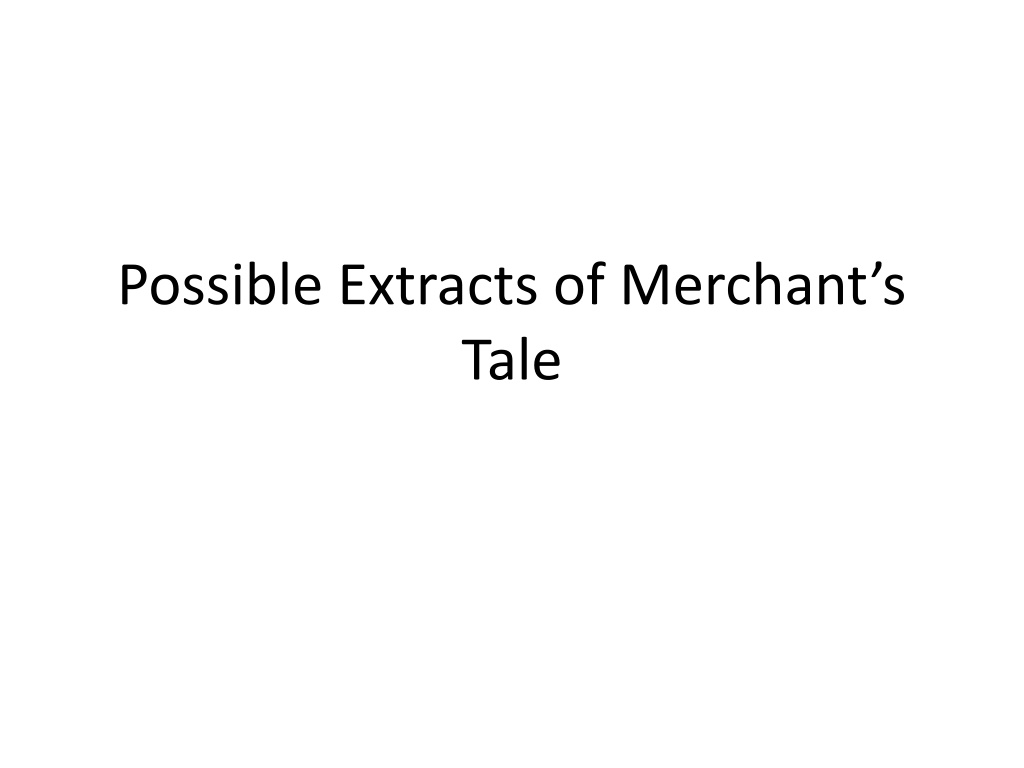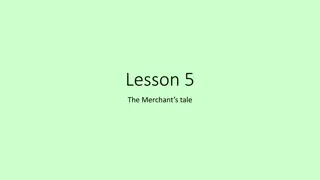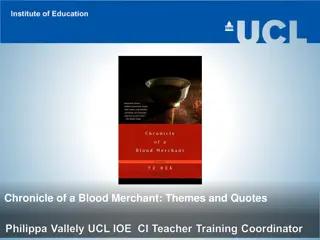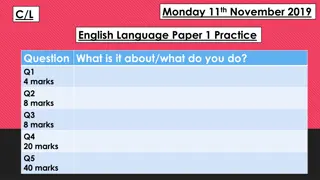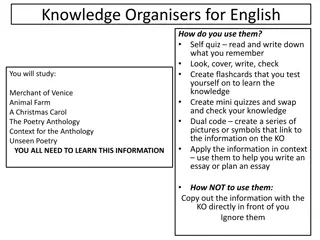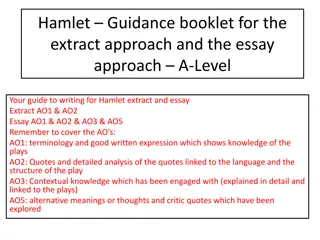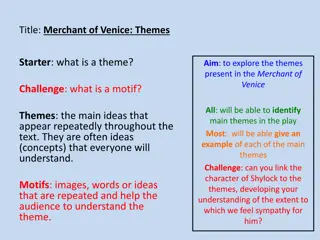Possible Extracts of Merchant's Tale
The Merchant's Tale depicts the woes of marriage through the Merchant's prologue and Januarie's attitude towards marriage. The Merchant laments his terrible wife while Januarie praises the virtues of having a wife as God's gift and a necessary companion. The excerpts highlight the contrasting views on marriage and set the stage for ironic discussions on the subject.
Download Presentation

Please find below an Image/Link to download the presentation.
The content on the website is provided AS IS for your information and personal use only. It may not be sold, licensed, or shared on other websites without obtaining consent from the author.If you encounter any issues during the download, it is possible that the publisher has removed the file from their server.
You are allowed to download the files provided on this website for personal or commercial use, subject to the condition that they are used lawfully. All files are the property of their respective owners.
The content on the website is provided AS IS for your information and personal use only. It may not be sold, licensed, or shared on other websites without obtaining consent from the author.
E N D
Presentation Transcript
(Lines 1-48) MERCHANTS PROLOGUE Wepyng and waylyng, care and oother sorwe 1214 I knowe ynogh, on even and a-morwe," 1215 Quod the Marchant, "and so doon other mo 1216 That wedded been. I trowe that it be so, 1217 For wel I woot it fareth so with me. 1218 I have a wyf, the worste that may be; 1219 For thogh the feend to hire ycoupled were, 1220 She wolde hym overmacche, I dar wel swere. 1221 What sholde I yow reherce in special 1222 Hir hye malice? She is a shrewe at al. 1223 Ther is a long and large difference 1224 Bitwix Grisildis grete pacience 1225 And of my wyf the passyng crueltee. 1226 Were I unbounden, also moot I thee, 1227 I wolde nevere eft comen in the snare. 1228 We wedded men lyven in sorwe and care. 1229 Assaye whoso wole, and he shal fynde 1230 That I seye sooth, by Seint Thomas of Ynde, 1231 As for the moore part -- I sey nat alle. 1232 God shilde that it sholde so bifalle! "A, goode sire Hoost, I have ywedded bee 1234 Thise monthes two, and moore nat, pardee; 1235 And yet, I trowe, he that al his lyve 1236 Wyflees hath been, though that men wolde him ryve 1237 Unto the herte, ne koude in no manere Tellen so muchel sorwe as I now heere Koude tellen of my wyves cursednesse!" Now," quod oure Hoost, "Marchaunt, so God yow blesse, 1241 Syn ye so muchel knowen of that art Ful hertely I pray yow telle us part. "Gladly," quod he, "but of myn owene soore, For soory herte, I telle may namoore." MERCHANTS TALE 1245 Whilom ther was dwellynge in Lumbardye 1246 A worthy knyght, that born was of Pavye,, 1247 In which he lyved in greet prosperitee; 1248 And sixty yeer a wyflees man was hee, 1249 And folwed ay his bodily delyt 1250 On wommen, ther as was his appetyt, 1251 As doon thise fooles that been seculeer. 1252 And whan that he was passed sixty yeer, 1253 Were it for hoolynesse or for dotage 1254 I kan nat seye, but swich a greet corage 1255 Hadde this knyght to been a wedded man 1256 That day and nyght he dooth al that he kan 1257 T' espien where he myghte wedded be, Preyinge oure Lord to graunten him that he Mighte ones knowe of thilke blisful lyf That is bitwixe an housbonde and his wyf, Allusion to Clerk s Tale Griselda LINKS: neither Merchant or Januarie know the holiness or purity marriage is meant to bring. Merchant speaks through Januarie with this ignorance of what a good wife is like.
(Lines 99-149)- This section introduces Januarie s attitude to marriage and will set up numerous discussions about what actually happens and open the discussion of irony. A wyf is Goddes yifte verraily; Alle othere manere yiftes hardily, As londes, rentes, pasture, or commune, Or moebles -- alle been yiftes of Fortune That passen as a shadwe upon a wal. But drede nat, if pleynly speke I shal: A wyf wol laste, and in thyn hous endure, Wel lenger than thee list, paraventure. Mariage is a ful greet sacrement. He which that hath no wyf, I holde hym shent; He lyveth helplees and al desolat I speke of folk in seculer estaat. And herke why -- I sey nat this for noght That womman is for mannes helpe ywroght. The hye God, whan he hadde Adam maked, And saugh him al allone, bely-naked, God of his grete goodnesse seyde than, "Lat us now make an helpe unto this man Lyk to hymself"; and thanne he made him Eve. Heere may ye se, and heerby may ye preve, That wyf is mannes helpe and his confort, His paradys terrestre, and his disport. So buxom and so vertuous is she They moste nedes lyve in unitee. O flessh they been, and o fleesh, as I gesse, Hath but oon herte, in wele and in distresse. views conflict Januarie s Attitude to marriage- Goddes yifte , sees it as apossession A wyf! a, Seinte Marie, benedicite! How myghte a man han any adversitee That hath a wyf? Certes, I kan nat seye. The blisse which that is bitwixe hem tweye Ther may no tonge telle, or herte thynke. If he be povre, she helpeth hym to swynke; She kepeth his good, and wasteth never a deel; Al that hire housbonde lust, hire liketh weel; She seith nat ones "nay," whan he seith "ye. "Do this," seith he; "Al redy, sire," seith she. O blisful ordre of wedlok precious, Thou art so murye, and eek so vertuous,, And so commended and appreved eek That every man that halt hym worth a leek Upon his bare knees oughte al his lyf Thanken his God that hym hath sent a wyf, Or elles preye to God hym for to sende A wyf to laste unto his lyves ende. For thanne his lyf is set in sikernesse; He may nat be deceyved, as I gesse, So that he werke after his wyves reed. Thanne may he boldely beren up his heed, They been so trewe and therwithal so wyse; For which, if thou wolt werken as the wyse, Do alwey so as wommen wol thee rede. Januarie s praises to biblical figures show his gratitude and excitement of marriage Irony- The Merchant s adversitee is his wife Irony- Biblical allusion to Adam&Eve. Eve is Adam s downfall. All Christians knew this. Eve is pejorative not positive. Janurie s attitude that women will serve- irony as Merchant tells of them being able to outmatch the devil Irony- Merchant s Overview: Januarie s attitude to marriage is what makes the irony as it contrasts with merchant s prologue. With Januarie s over-the-top excitement, it Is clear the Merchant is using his ignorance of marriage as a point of irony and even setting up dark comedy, and some pity as another man is about to fall for the marital trap.
(Lines 173-210) Plenty of characterisation and the use of Auctoritas and Exempla in the writing. Still focused on Januarie s lust-driven search for a young wife. Contrast- Januarie calls himself hoor and oold , to the extent of being on his pittes brynke . He wants a wife who nat passe twenty yeer . He seems foolish and before he s married the compatibility is questioned and doubted by the reader. If thou lovest thyself, thou lovest thy wyf; No man hateth his flessh, but in his lyf He fostreth it, and therfore bidde I thee Cherisse thy wyf, or thou shalt nevere thee. Housbonde and wyf, what so men jape or pleye, Of worldly folk holden the siker weye; They been so knyt ther may noon harm bityde, And namely upon the wyves syde. For which this Januarie, of whom I tolde,, Considered hath, inwith his dayes olde, The lusty lyf, the vertuous quyete, That is in mariage hony-sweete, And for his freendes on a day he sente, To tellen hem th' effect of his entente. With face sad his tale he hath hem toold. He seyde, "Freendes, I am hoor and oold, And almoost, God woot, on my pittes brynke; Upon my soule somwhat moste I thynke. I have my body folily despended; Blessed be God that it shal been amended! For I wol be, certeyn, a wedded man, And that anoon in al the haste I kan. Unto som mayde fair and tendre of age, I prey yow, shapeth for my mariage Al sodeynly, for I wol nat abyde; And I wol fonde t' espien, on my syde, To whom I may be wedded hastily. But forasmuche as ye been mo than I, Ye shullen rather swich a thyng espyen Than I, and where me best were to allyen.). "But o thyng warne I yow, my freendes deere, I wol noon oold wyf han in no manere. She shal nat passe twenty yeer, certayn; Oold fissh and yong flessh wolde I have fayn. Bet is," quod he, "a pyk than a pykerel, And bet than old boef is the tendre veel. I wol no womman thritty yeer of age; It is but bene-straw and greet forage. Irony- Januarie says blessed be God that it shal be amended! , making it seem like his choice to marry is to please God as marriage is a holy thing. But he wants her for her oold fissh and yong flessh , the sexual imagery is crude and shows what Januarie is really after. This passage carries the irony that despite all the praises to God and holiness, Januarie really wants a sexually attractive wife. The fact that he only cares about her tendre body and age undermines his reasoning for wanting marriage and forebodes his inevitable Adam-like betrayal.
Lines 217-257 focused on the issues around youth and marriage Right as men may warm wex with handes plye. Wherfore I sey yow pleynly, in a clause, I wol noon oold wyf han right for this cause. For if so were I hadde swich myschaunce That I in hire ne koude han no plesaunce, Thanne sholde I lede my lyf in avoutrye And go streight to the devel whan I dye. Ne children sholde I none upon hire geten; Yet were me levere houndes had me eten Than that myn heritage sholde falle In straunge hand, and this I telle yow alle. I dote nat; I woot the cause why Men sholde wedde, and forthermoore woot I Ther speketh many a man of mariage That woot namoore of it than woot my page For whiche causes man sholde take a wyf. If he ne may nat lyven chaast his lyf, Take hym a wyf with greet devocioun, By cause of leveful procreacioun Of children to th' onour of God above, And nat oonly for paramour or love; And for they sholde leccherye eschue, And yelde hir dette whan that it is due; Or for that ech of hem sholde helpen oother In meschief, as a suster shal the brother, And lyve in chastitee ful holily. But sires, by youre leve, that am nat I. For -- God be thanked! -- I dar make avaunt I feele my lymes stark and suffisaunt To do al that a man bilongeth to; I woot myselven best what I may do. Though I be hoor, I fare as dooth a tree That blosmeth er that fruyt ywoxen bee; And blosmy tree nys neither drye ne deed.. I feele me nowhere hoor but on myn heed; Myn herte and alle my lymes been as grene As laurer thurgh the yeer is for to sene. And syn that ye han herd al myn entente, I prey yow to my wyl ye wole assente." Diverse men diversely hym tolde Using lose biblical teachings as justification. Its important he should appear to be doing this for God and the spirit of matrimony, but in truth he wants an heir and a young wife. Januarie s belief that his wife will be 100% subservient He wants a wife to bear him an heir and give him pleasure, evident from his explanations. Contrasts with his earlier view of holiness. Januarie seems almost childish in this approach. Seems like he s been promised a wife as a delicious desert if he eats his main course which is the Godly and holy side of marriage.
Lines 349-387 Justinus advice is ignored as a prelude to a discussion of Januarie s character. We also see Chaucer s own voice possibly intruding at the end of this section: love is blind allday and may nat see Januarie once again disregarding auctoritas, this time Seneca. 1580 Many fair shap and many a fair visage 1581 Ther passeth thurgh his herte nyght by nyght, 1582 As whoso tooke a mirour, polisshed bryght, 1583And sette it in a commune market-place, 1584 Thanne sholde he se ful many a figure pace 1585 By his mirour; and in the same wyse 1586 Gan Januarie inwith his thoght devyse 1587 Of maydens whiche that dwelten hym bisyde. 1588 He wiste nat wher that he myghte abyde. 1589 For if that oon have beaute in hir face, 1590 Another stant so in the peples grace For hire sadnesse and hire benyngnytee 1592 That of the peple grettest voys hath she; 1593 And somme were riche and hadden badde name. 1594 But nathelees, bitwixe ernest and game, 1595 He atte laste apoynted hym on oon, 1596 And leet alle othere from his herte goon, 1597 And chees hire of his owene auctoritee; 1598 For love is blynd alday, and may nat see 1561 To han his wyf allone. Trusteth me, 1562 Ye shul nat plesen hire fully yeres thre -- 1563 This is to seyn, to doon hire ful plesaunce. 1564 A wyf axeth ful many an observaunce. 1565 I prey yow that ye be nat yvele apayd." 1566 "Wel," quod this Januarie, "and hastow ysayd? 1567 Straw for thy Senek, and for thy proverbes! 1568 I counte nat a panyer ful of herbes 1569 Of scole-termes. Wyser men than thow, 1570 As thou hast herd, assenteden right now 1571 To my purpos. Placebo, what sey ye?" 1572 "I seye it is a cursed man," quod he, 1573 "That letteth matrimoigne, sikerly." 1574 And with that word they rysen sodeynly, 1575 And been assented fully that he sholde 1576 Be wedded whanne hym liste and where he wolde. 1577 Heigh fantasye and curious bisynesse 1578 Fro day to day gan in the soule impresse 1579 Of Januarie aboute his mariage. The demand to my purpos shows Januarie is looking for people to tell him what he wants to hear. Very unwise, reminding the audience of Ethelred the Unready a 10th century king who took ill-advise. The way he imagines the women he may marry is like purchasing goods at a market. Unrealistic way of thinking. This preludes to the unhappy marriage too, his idea of May exists in his mind, she exists outside his mind however. In choosing a wife he is only listening to what peple have said, without meeting any of the women himself to learn if they will be a good wife. Irony as love is not blinding, his lust is. foreshadowing of Januarie s blinding.
Lines 425-461 This section looks at Justinus and his character as well as allowing a discussion of Januarie and the ironic outcome of this advice which Januarie ignores. Justinus name shows he s the voice of reason. Suggestion he is the Merchant s voice in the tale as he has the same opinions, being a married man and knowing the woe of it. "I have," quod he, "herd seyd, ful yoore ago, Ther may no man han parfite blisses two -- This is to seye, in erthe and eek in hevene. For though he kepe hym fro the synnes sevene, And eek from every branche of thilke tree, Yet is ther so parfit felicitee And so greet ese and lust in mariage That evere I am agast now in myn age That I shal lede now so myrie a lyf, So delicat, withouten wo and stryf, That I shal have myn hevene in erthe heere. For sith that verray hevene is boght so deere With tribulacion and greet penaunce, How sholde I thanne, that lyve in swich plesaunce As alle wedded men doon with hire wyvys, Come to the blisse ther Crist eterne on lyve ys? This is my drede, and ye, my bretherentweye, Assoilleth me this question, I preye. Justinus, which that hated his folye, Answerde anon right in his japerye; And for he wolde his longe tale abregge, He wolde noon auctoritee allegge, But seyde, "Sire, so ther be noon obstacle Oother than this, God of his hygh miracle And of his mercy may so for yow wirche That, er ye have youre right of hooly chirche, Ye may repente of wedded mannes lyf, In which ye seyn ther is no wo ne stryf. And elles, God forbede but he sente A wedded man hym grace to repente Wel ofte rather than a sengle man! And therfore, sire -- the beste reed I kan -- Dispeire yow noght, but have in youre memorie, Paraunter she may be youre purgatorie! She may be Goddes meene and Goddes whippe; Thanne shal youre soule up to hevene skippe Swifter than dooth an arwe out of a bowe. Despite all the warnings from justinus, his only worry comes from the opposite viewpoint: that marriage may be his downfall as no man can have two blisses . Ironic Humour as Januarie is so close to realising this will be folly but his realisation comes from the wrong side of reasoning Links biblical damnation to wives, just like the Merchant saying she would outmatch the feend . Reminder God is wrathful too, considering Januarie s less than godly life of sleeping with women upon his will, his wife may be his punishment in disguise
Contrast ;joye and blisse, enacting Damyan has interrupted the Merchant with caesura. Emphasis of IP on Dam Lines 538-580- Short wedding This Januarie is ravysshed in a traunce At every tyme he looked on hir face; But in his herte he gan hire to manace That he that nyght in armes wolde hire streyne Harder than evere Parys dide Eleyne. But nathelees yet hadde he greet pitee That thilke nyght offenden hire moste he,, And thoughte, "Allas! O tendre creature, Now wolde God ye myghte wel endure Al my corage, it is so sharp and keene! I am agast ye shul it nat susteene. But God forbede that I dide al my myght! Now wolde God that it were woxen nyght, And that the nyght wolde lasten everemo. I wolde that al this peple were ago." And finally he dooth al his labour, As he best myghte, savynge his honour,, To haste hem fro the mete in subtil wyse.. The tyme cam that resoun was to ryse; And after that men daunce and drynken faste, Couplet face manace links her face to idea of menace. And spices al aboute the hous they caste, And ful of joye and blisse is every man ---- Al but a squyer, highte Damyan, Which carf biforn the knyght ful many a day. He was so ravysshed on his lady May That for the verray peyne he was ny wood. Almoost he swelte and swowned ther he stood, So soore hath Venus hurt hym with hire brond, As that she bar it daunsynge in hire hond; And to his bed he wente hym hastily. Namoore of hym at this tyme speke I, But there I lete hym wepe ynogh and pleyne Til fresshe May wol rewen on his peyne. O perilous fyr, that in the bedstraw bredeth! O famulier foo, that his servyce bedeth! O servant traytour, false hoomly hewe, Lyk to the naddre in bosom sly untrewe, God shilde us alle from youre aqueyntaunce! O Januarie, dronken in plesaunce In mariage, se how thy Damyan, Thyn owene squier and thy borne man, Entendeth for to do thee vileynye. Satanic imagery- fyr DAMyan God shilde (begs for protection) Irony as May doesn t think his sex is worth a bene as he is too hoor . Yet Januarie is showing a side of care, he worries that his actions are too much for his maiden, change in perception. 9 line warning about Damyan being treacherous Allusion to famous romantics- Either ironic as Januarie and May aren t lovers, or funny as it is meant to be a loving image but some say Paris was an abductor and rapist, so Januarie is saying he his actions are harder than that. streyne adds to this imagery.
Lines 609-650- love making Men drynken and the travers drawe anon.. The bryde was broght abedde as stille as stoon; And whan the bed was with the preest yblessed, Out of the chambre hath every wight hym dressed, And Januarie hath faste in armes take His fresshe May, his paradys, his make. He lulleth hire; he kisseth hire ful ofte; With thikke brustles of his berd unsofte,, Lyk to the skyn of houndfyssh, sharp as brere For he was shave al newe in his manere He rubbeth hire aboute hir tendre face, And seyde thus, "Allas! I moot trespace To yow, my spouse, and yow greetly offende Er tyme come that I wil doun descende. But nathelees, considereth this," quod he, "Ther nys no werkman, whatsoevere he be, That may bothe werke wel and hastily; This wol be doon at leyser parfitly. It is no fors how longe that we pleye; In trewe wedlok coupled be we tweye, And blessed be the yok that we been inne, For in oure actes we mowe do no synne. A man may do no synne with his wyf, Ne hurte hymselven with his owene knyf,, Fabliau style- couplet ofte and unsofte almost shocks audience as the romantic kisseth is grotesque. Fantasy meets reality. For we han leve to pleye us by the lawe. Thus laboureth he til that the day gan dawe; And thanne he taketh a sop in fyn clarree, And upright in his bed thanne sitteth he, And after that he sang ful loude and cleere, And kiste his wyf, and made wantown cheere. He was al coltissh, ful of ragerye, And ful of jargon as a flekked pye. The slakke skyn aboute his nekke shaketh Whil that he sang, so chaunteth he and craketh. But God woot what that May thoughte in hir herte, Whan she hym saugh up sittynge in his sherte, In his nyght-cappe, and with his nekke lene; She preyseth nat his pleyyng worth a bene. Thanne seide he thus, "My reste wol I take; Now day is come, I may no lenger wake. And doun he leyde his heed and sleep til pryme. And afterward, whan that he saugh his tyme, Up ryseth Januarie; but fresshe May Heeld hire chambre unto the fourthe day, As usage is of wyves for the beste. For every labour somtyme moot han reste, Couplet offende and decende- more gross humour. The e s allow for the orator to elongate these words, making the vulgarity more evident Form- May doesn't t speak at all. Her personality isn t important. It is powerful. Is she silent out of fear? Or disinterest? Bawdy irony- His coltishh lust contrasts to his slakke skyn , the irony is he acts like a young horse full of strength and vitality but is old and slack Couplet shows May hasn t been offended , just not impressed Metaphor of labour for sex. Uses a guise to explain he wants to do a good job . Not romantic and is crude- French model
Lines 662-704L662 Form- seperated by names, not a single entity God be thyn helpe! I kan no bettre seye. This sike damyan in venus fyr So brenneth that he dyeth for desyr, For which he putte his lyf in aventure. No lenger myghte he in this wise endure, But prively a penner gan he borwe, And in a lettre wroot he al his sorwe, In manere of a compleynt or a lay, Unto his faire, fresshe lady may; And in a purs of sylk, heng on his sherte He hath it put, and leyde it at his herte. The moone, that at noon was thilke day That januarie hath wedded fresshe may In two of tawr, was into cancre glyden; So longe hath mayus in hir chambre abyden, As custume is unto thise nobles alle. A bryde shal nat eten in the halle Til dayes foure, or thre dayes atte leeste, Ypassed been; thanne lat hire go to feeste. The fourthe day compleet fro noon to noon, Whan that the heighe masse was ydoon, In halle sit this januarie and may, As fressh as is the brighte someres day. And so bifel how that this goode man Remembred hym upon this damyan, And seyde, seynte marie! how may this be, That damyan entendeth nat to me? Is he ay syk, or how may this bityde? His squieres, whiche that stooden ther bisyde, Excused hym by cause of his siknesse, Which letted hym to doon his bisynesse; Noon oother cause myghte make hym tarye. That me forthynketh, quod this januarie, He is a gentil squier, by my trouthe! If that he deyde, it were harm and routhe. He is as wys, discreet, and as secree As any man I woot of his degree, And therto manly, and eek servysable. And for to been a thrifty man right able. But after mete, as soone as evere I may, I wol myself visite hym, and eek may, To doon hym al the confort that I kan. And for that word hym blessed every man, Damyan fulfills the religion of love idea of the lover becoming pained, in this case sike due to his pining. irony as Januarie is so adamant his squire is trustworthy Either sympathy as he is in something beyond his control (God Venus is doing this to him) or more likely it is a metaphor for lust and hellfire extending his satanic allusion. Couplet desyr makes this more likely. List of 3 things both a cunning lover needs to be and a satanic figure. Janaurie can t see these qualities aid adultery De Amore by Andreas Capellanus shows that these courtly love ideas would be known to Chaucer s audience, and such premises as the four stages of love- 1.hope, 2.offering kisses,3. enjoyment of intimacy, 4.abandonment of person. Damyan is stage 1 hope Damyan is fulfilling the courtly lovers role. Irony as Januarie is a knight but he is the least chivalrous and most crude out of the two. Humour in couplet borwe and sorwe as Damyan s hardest task is asking for a pen to borrow, contrasting mundane with dramatic.
Lines 721-764 Who studieth now but faire fresshe may? Adoun by olde januarie she lay, That sleep til that the coughe hath hym awaked. Anon he preyde hire strepen hire al naked; He wolde of hire, he seyde, han som plesaunce, And seyde hir clothes dide hym encombraunce, And she obeyeth, be hire lief or looth. But lest that precious folk be with me wrooth, How that he wroghte, I dar nat to yow telle; Or wheither hire thoughte it paradys or helle. But heere I lete hem werken in hir wyse Til evensong rong, and that they moste aryse. Were it by destynee or aventure, Were it by influence or by nature, Or constellacion, that in swich estaat The hevene stood, that tyme fortunaat Was for to putte a bille of venus werkes -- For alle thyng hath tyme, as seyn thise clerkes -- To any womman, for to gete hire love, I kan nat seye; but grete God above, That knoweth that noon act is causeless, He deme of al, for I wole hole my pees. With alle hir wommen, unto damyan. Doun by his beddes syde sit she than, Confortynge hym as goodly as she may. This damyan, whan that his tyme he say, In secree wise his purs and eek his bille, In which that he ywriten hadde his wille, Hath put into hire hand, withouten moore, And softely to hire right thus seyde he: And softely to hire right thus seyde he: Mercy! and that ye nat discovere me, For I am deed if that this thyng be kyd. This purs hath she inwith hir bosom hyd, And wente hire wey; ye gete namoore of me. But unto januarie ycomen is she, That on his beddes syde sit ful softe. He taketh hire, and kisseth hire ful ofte, And leyde hym doun to slepe, and that anon. She feyned hire as that she moste gon Ther as ye woot that every wight moot neede; And whan she of this bille hath taken heede, She rente it al to cloutes atte laste, And in the pryvee softely it caste. Their distance is made clear in contrasting fresshe may and olde januarie Merchant reminds us his narration, and in his namoore line he leaves his judgment of Damyan implicit, also leaves judgment to the audience. Irony in contrast of phonetic rhyming pryvee and softely , her fresshe elegance extends to throwing love letters down the toilet The implicit criticism of May throughout the poem has links to Andreas Capellanus. In book 3 Rejection of love women seem vile, translation of everything a women says has the intention of deceiving. The impact the bible has had on literature in this regard extends to others around Chaucer s day. As a well travelled man, acting almost as a spy in France, he may have come across this French book. Merchant citing possible reasons for May s deception. Warning of God s judgment
Lines 783-825 That every wight is fayn to speke hym good; And fully in his lady grace he stood. Thus lete I damyan aboute his nede, And in my tale forth I wol procede. Somme clerkes holden that felicitee Stant in delit, and therfore certeyn he, This noble januarie, with al his myght, In honest wyse, as longeth to a knyght, Shoop hym to lyve ful deliciously. His housynge, his array, as honestly To his degree was maked as a kynges. Amonges othere of his honeste thynges, He made a gardyn, walled al with stoon; So fair a gardyn woot I nowher noon. For, out of doute, I verraily suppose That he that wroot the romance of the rose Ne koude of it the beautee wel devyse; Ne priapus ne myghte nat suffise, Though he be God of gardyns, for to telle The beautee of the gardyn and the welle, That stood under a laurer alwey grene. This gentil may, fulfilled of pitee, Right of hire hand a lettre made she, In which she graunteth hym hire verray grace. Ther lakketh noght, oonly but day and place, Wher that she myghte unto his lust suffise; For it shal be right as he wole devyse. And whan she saugh hir tyme, upon a day, To visite this damyan gooth may, And sotilly this lettre doun she threste Under his pilwe, rede it if hym leste. She taketh hym by the hand, and harde hym twiste So secrely that no wight of it wiste, And bad hym been al hool, and forth she wente To januarie, whan that he for hire sente. Up riseth damyan the nexte morwe; Al passed was his siknesse and his sorwe. He kembeth hym, he preyneth hym and pyketh, He dooth al that his lady lust and lyketh; And eek to januarie he gooth as lowe As evere dide a dogge for the bowe. He is so plesant unto every man (for craft is al, whoso that do it kan) The beauty of the garden is apparently beyond the description of Praipus, Roman god of Garden. Exaggeration helps show to extent of Garden s beauty. The Religion of Love sickness has been fulfilled with him being cured on recognition and receiving of affection Introduction to the garden introduces the area of deception. At this point alarm bells ring as people remember the Garden of Eden and having May already seem like an untrustworthy Eve figure the link is nearly complete
Allusion to Greek history- Argus was used by Hera to guard Io, Zeus lover nymph. Argus was killed my Hermes or in some versions, easily tricked by women. Lines 885-912 The emphasis allows to stress Fre which allows the irony to come through the narrator Lo, argus, which that hadde an hondred yen, For al that evere he koude poure or pryen, Yet was he blent, and, God woot, so been mo, That wenen wisly that it be nat so. Passe over is an ese, I sey namoore. This fresshe may, that I spak of so yoore, In warm wex hath emprented the clyket That januarie bar of the smale wyket, By which into his gardyn ofte he wente; And damyan, that knew al hire entente, The cliket countrefeted pryvely. Ther nys namoore to seye, but hastily Som wonder by this clyket shal bityde, Which ye shul heeren, if ye wole abyde. Upon that oother syde damyan Bicomen is the sorwefulleste man That evere was; for neither nyght ne day Ne myghte he speke a word to fresshe may, As to his purpos, of no swich mateere, But if that januarie moste it heere, That hadde an hand upon hire everemo. But nathelees, by writyng to and fro, And privee signes, wiste he what she mente, And she knew eek the fyn of his entente. O januarie, what myghte it thee availle, Thogh thou myghte se as fer as shippes saille? For as good is blynd deceyved be As to be deceyved whan a man may se. Irony- Januarie spoke earlier how he wanted a wife like wex that he could mould to suit him, May uses Wax to deceive him. The roles have been reversed in reality. Suggestion he still has his hands all over her, most likely groping her, thus his character has not developed far from the start Typical- apostrophe with drama O januarie like he has done before O perlious fyr sets up a prelude to May s deception. More apostrophe from The Merchant. Adds the narrative element to the story. It helps break it up the tempo of the story to build up suspense
